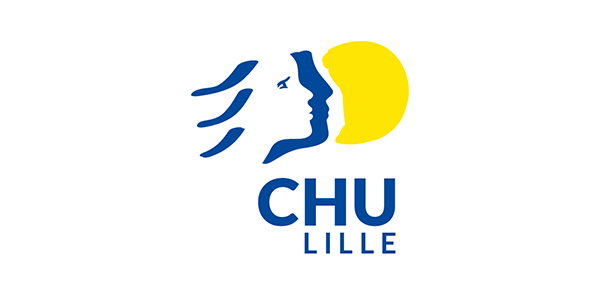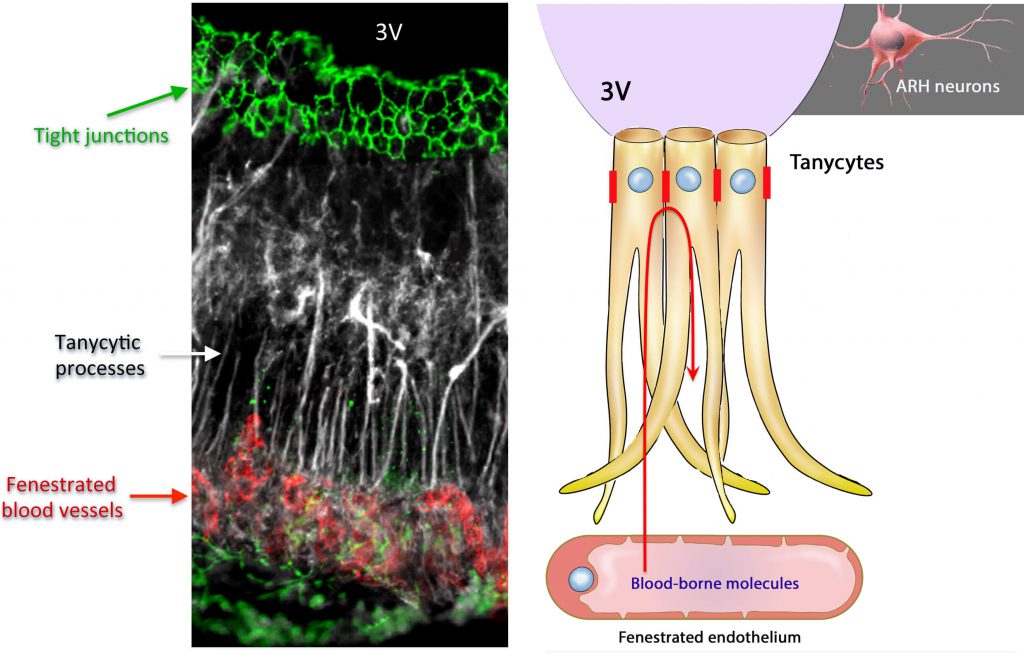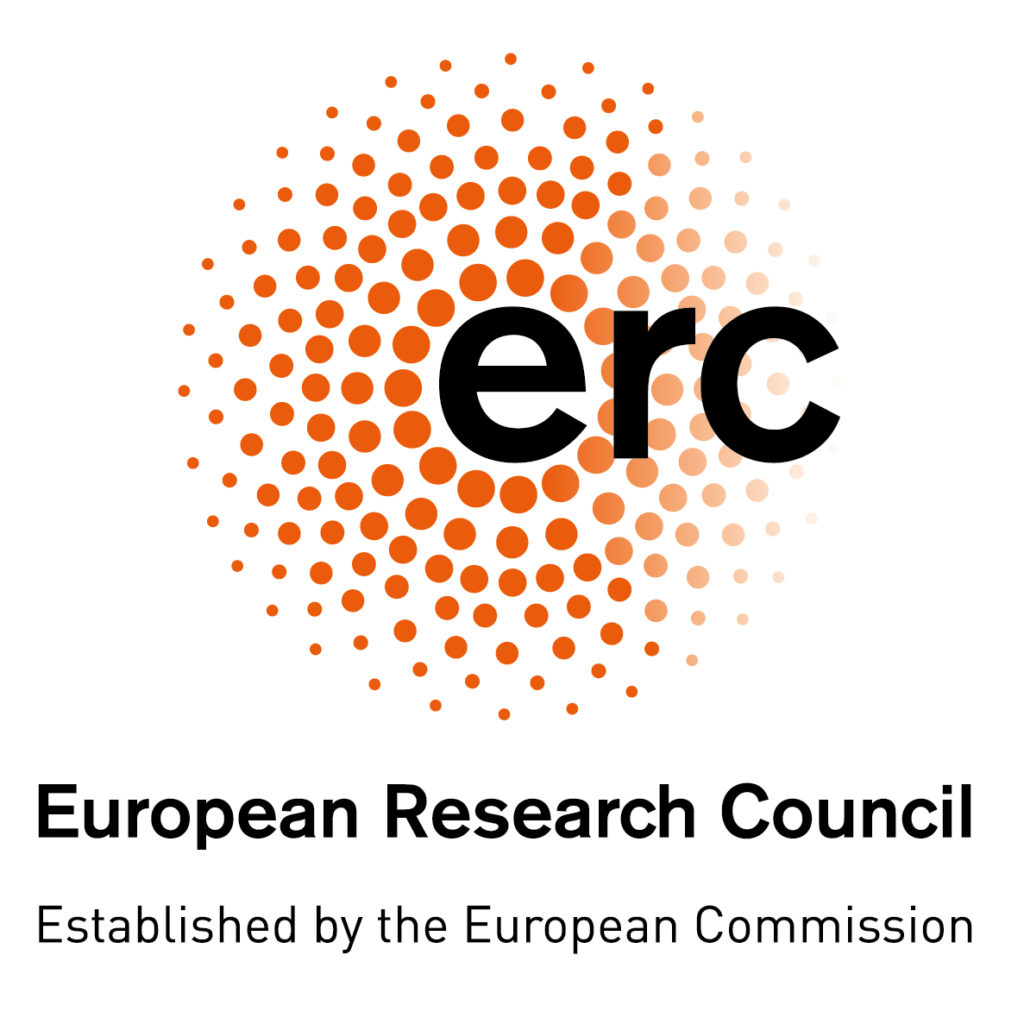







ERC-WATCH (Well-Aging and the Tanycytic Control of Health) is a synergy grant which is jointly awarded to the teams of Vincent Prévot (cPI) (INSERM, Lille, France), Markus Schwaninger (PI) (University of Lübeck, Lübeck, Germany) and Ruben Nogueiras (PI) (University of Santiago de Compostela, Spain). This ambitious project aims to ascertain whether a disruption in the transport of circulating metabolic signals to the brain via tanycytes is associated with cognitive decline. With their unique set of expertise, each of the three laboratories will complement their research interest to successfully complete this groundbreaking project.
The European Research Council (ERC) is a public body that promotes excellent scientific & technological research through competitive funding. It was established in 2007 by the European Commission. ERC is composed of a Scientific Council; a governing body formed by distinguished researchers who act on behalf of the European scientific community to foster creativity & innovative research, and an executive agency (ERCEA) that implements the strategy set by the scientific council. ERC aims to promote and support the best talents in Europe across all scientific fields, with a focus on an investigator driven or “bottom-up” frontier research. Towards the achievement of these goals, ERC offers a number of grant schemes for researchers in various stages of their career.
Synergy is one of the grants awarded by ERC to a group of two to four (maximum) Principal Investigators (PIs), one of whom is designated as the corresponding PI (cPI). These PIs bring different skills and resources and work together to address an ambitious research problem.

Vincent Prevot, Markus Schwaninger and Ruben Nogueiras obtained a 9.8-million-euro European Research Council (ERC) Synergy Grant to carry out the WATCH (Well-Aging and the Tanycytic Control of Health) project. In a span of seven years, the WATCH project aims to ascertain whether a disruption in the communication between peripheral organs and regulatory circuits in the brain via tanycytes is associated with metabolic disorders and cognitive decline. Preliminary research has yielded several positive insights, which are being further investigated in rodent models and in human patients. Each of the three teams possesses a unique and complementary set of skills, knowledge and expertise, and the three teams work together in synergy to successfully complete this groundbreaking research project.
The brain controls the release of hormones that act on peripheral organs to control diverse bodily processes. Conversely, certain molecules, notably metabolic signals, released by peripheral organs into the bloodstream inform the brain about the physiological state of the organism. Identifying these molecular players and understanding their mode of action is a key step in understanding metabolic imbalances and diseases in which they play a part. Within the brain, a small structure known as hypothalamus is the main centre for sensing and responding to signals from various peripheral organs. At the base of the hypothalamus is the median eminence (ME), a “circumventricular organ” (CVO), so called because it borders one of the brain ventricles, waterways of the brain filled with cerebrospinal fluid (CSF). A unique feature of the ME and other CVOs is the absence of the typical blood-brain barrier (BBB) made up of leakproof blood capillaries, and the presence of specialized glial cells known as tanycytes.
Tanycytes are extremely versatile cells that act in a number of different ways. While their cell bodies line the ventricular wall and are in contact with the CSF, their long projections extend to the external surface of the brain, including the region under the ME, where a capillary bed of fenestrated or leaky blood vessels connects the hypothalamus with the pituitary gland. In addition to acting as a barrier the ME depending on physiological conditions, they interact with numerous hypothalamic neurons that secrete neurohormones, which then stimulate the pituitary gland to secrete other hormones that act on various bodily organs and systems, regulating a number of essential body functions such as growth, reproduction, stress, etc. Tanycytes also act as gatekeepers by controlling the exchange of metabolic signals between the peripheral blood and the CSF and hypothalamic neurons, and actively shuttle many metabolic signals into the brain. For example, the Prevot lab has shown that they transport leptin, a satiety hormone, into the brain, and the breakdown of leptin access to hypothalamic neurons is known to be involved in uncontrolled feeding and obesity. Similarly, tanycytes also transport other metabolic hormones that are involved in the establishment and functioning of neural circuits involved in feeding and energy balance, such as ghrelin and insulin. Interestingly, obesity, a metabolic disorder, is a risk factor for dementia, and conversely, individuals with Alzheimer’s disease display metabolic deregulation.
To carry out the WATCH project, researchers from the three teams use a multitude of genetically modified mouse models and cutting-edge technologies to better understand the function of tanycytes and how this could be altered by diseases such as obesity or diabetes and during aging. In addition, using cohorts of obese patients (the LEPTOB study) or patients with age-related cognitive decline, such as Alzheimer’s disease or frontotemporal dementia (the BIOWATCH study), they are carrying out biochemical and cognitive analyses and brain imaging in these patients to understand how normal physiological processes are altered by these conditions, and whether improving tanycytic function, for example, with transport-enhancing drugs, can improve metabolic imbalances and age-related deficits. In 2020, faced with the COVID-19 pandemic, the three teams were among the first to observe the SARS-CoV-2 virus in the brain of patients, and added the investigation of mechanisms of SARS-CoV-2 infection and its hormonal, metabolic and cognitive consequences to the project.
Vincent Prevot also obtained an ERC Proof of Concept grant, UPGRADE, in 2023 to further investigate and leverage certain findings of the WATCH project for the treatment of cognitive decline. Other Proof of Concept grant applications are ongoing.






| Cookie | Duration | Description |
|---|---|---|
| cookielawinfo-checkbox-analytics | 11 months | This cookie is set by GDPR Cookie Consent plugin. The cookie is used to store the user consent for the cookies in the category "Analytics". |
| cookielawinfo-checkbox-functional | 11 months | The cookie is set by GDPR cookie consent to record the user consent for the cookies in the category "Functional". |
| cookielawinfo-checkbox-necessary | 11 months | This cookie is set by GDPR Cookie Consent plugin. The cookies is used to store the user consent for the cookies in the category "Necessary". |
| cookielawinfo-checkbox-others | 11 months | This cookie is set by GDPR Cookie Consent plugin. The cookie is used to store the user consent for the cookies in the category "Other. |
| cookielawinfo-checkbox-performance | 11 months | This cookie is set by GDPR Cookie Consent plugin. The cookie is used to store the user consent for the cookies in the category "Performance". |
| viewed_cookie_policy | 11 months | The cookie is set by the GDPR Cookie Consent plugin and is used to store whether or not user has consented to the use of cookies. It does not store any personal data. |